MercoPress. South Atlantic News Agency
Tag: Zhou Xiaochuan
-
Monday, October 3rd 2016 - 07:54 UTC
Yuan becomes global reserve currency but China will have to relax capital controls and the exchange rate
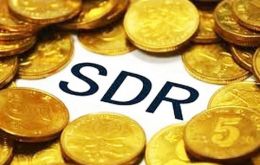
The Chinese currency Yuan entered a new phase in its journey to become more important to the world economy: starting on Saturday the Yuan is officially a member of the International Monetary Fund’s basket of global reserve currencies. Together, this group of currencies, known as Special Drawing Rights (SDR), forms a kind of pseudo-currency—used only by the IMF—to supplement countries’ official reserves.
-
Monday, February 15th 2016 - 07:20 UTC
With Chinese New Year over, central bank reaffirms strong Yuan policy
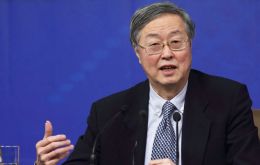
Chinese central bank governor Zhou Xiaochuan has accused “speculative forces” of targeting the country's currency, the Yuan, and argued there was no reason for the Yuan to keep depreciating in value and that China would not let international speculators dominate market sentiment.
-
Wednesday, September 10th 2014 - 06:59 UTC
Argentina plays the China card to bolster reserves: 800m pledged in first tranche
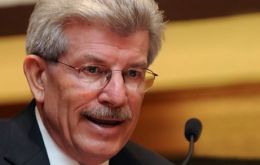
The Argentine Central Bank foreign reserves would be bolstered this year with up to 800 million dollars in Yuans transferred by China due to the first tranche of the money of the swap agreement signed between both countries, according to banking sources in Buenos Aires.
-
Monday, September 8th 2014 - 06:35 UTC
China aids Argentina: a billion dollars in Yuan pledged by end of the year
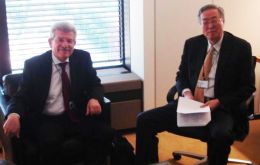
Argentina's central bank chief, Juan Carlos Fabrega, met his Chinese counterpart Zhou Xiaochuan in Basilea, Switzerland on Sunday to discuss how a currency swap worth billions of dollars will be put into action, the Argentine monetary authority said.
-
Friday, November 9th 2012 - 05:57 UTC
Outgoing Chinese leader: tackle corruption otherwise party and state will collapse

China’s outgoing leader has warned corruption could destroy the Communist Party but stepped up plans to double the size of the economy and build a powerful maritime force. President Hu Jintao unveiled an ambitious target to double per-capita incomes and implied the economy would achieve annual growth of about 7% over the next eight years.
-
Friday, May 20th 2011 - 10:16 UTC
China says new IMF chief should better represent emerging economies

The new leadership of the IMF should reflect changes in the world economic order and be more representative of emerging market economies, People’s Bank of China Governor Zhou Xiaochuan said on Thursday.
-
Wednesday, April 20th 2011 - 02:19 UTC
China urges US to adopt “responsible measures” to guarantee investors interests
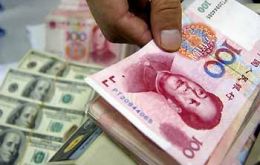
China, the top holder of U.S. Treasury bonds, urged the United States Tuesday to adopt “responsible measures” after ratings agency Standard & Poor's cut the outlook on U.S. sovereign debt to negative.
-
Monday, April 18th 2011 - 07:10 UTC
China’s anti-inflation crusade raises bank reserves: fourth time in four months

China raised banks' required reserves for the fourth time this year, extending the fight against excessive liquidity and stubbornly high inflation in the world's second-largest economy.
-
Friday, February 18th 2011 - 16:38 UTC
China again raised bank reserves (eight times in 12 months) to rein inflation

China’s central bank raised reserve requirements for lenders 10 days after boosting interest rates as Premier Wen Jiabao tackles accelerating inflation and the risk of asset bubbles in the fastest-growing major economy.
